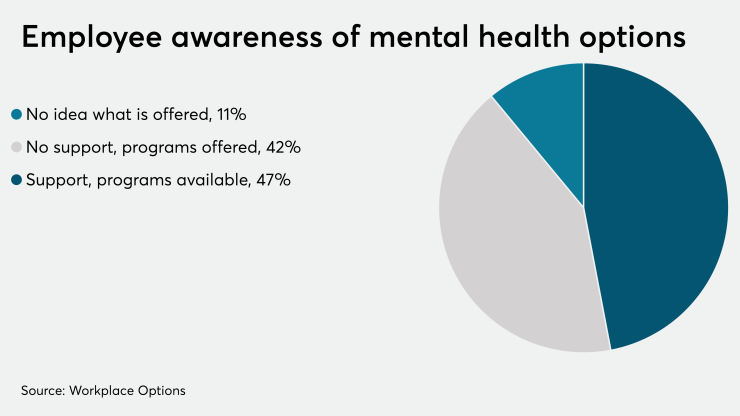With COVID-19 depression and seasonal depression about to collide, employers could be dealing with greater absenteeism among employees and less productivity.
Mental health issues often force employers to bear a disproportionate share of the costs, many of which are related to employee absenteeism in the workplace. About 200 million workdays are lost each year due to depression, costing employees between $17 billion and $44 billion, according to the Centers for Disease Control and Prevention.
“Even before COVID and the other challenges of 2020, we've been facing a mental health crisis in this country,” says Michael Boroff, the manager of the mental health program at Crossover Health, a virtual healthcare provider for employer clients. “Our nation's long-standing mental health crisis has been exacerbated by major societal stressors and now the need to treat mental health conditions virtually is on the forefront in a way that it has never been before.”
It’s vitally important for employers to invest in the mental health of their employees, especially as employees say their emotional well-being has been adversely affected by the COVID-19 pandemic. According to a Kaiser Family Foundation poll, 53% of U.S. adults have reported that their mental health had been negatively impacted by the virus.
Read More:
Crossover Health recently teamed up with Tridiuum, a provider of digital behavioral health solutions, on a new program to measure and study employee mental health and equip employers with data and solutions to provide their employees with the help they need.
"With therapy, a lot of work happens outside the session, and that's where tools like Tridiuum are invaluable in helping to proactively identify issues, track along with how members are doing, alert us to the need to adjust treatment plans, as well as urgent needs, like suicide alerts," Boroff says. “All of these things help our team be better therapists and lead to better outcomes for our members."
Even under normal circumstances the colder seasons can have an adverse effect on a person’s mental well-being. Seasonal affective disorder or seasonal depression is a type of depression that's related to changes in seasons. Those symptoms typically start in the fall and continue into winter and can include losing interest activities, low energy, trouble sleeping, difficulty concentrating and in extreme cases frequent thoughts of death or suicide, according to the Mayo Clinic.
With the possibility that employees could be burning out at a higher rate this holiday season, employers can provide better tools, benefits and resources to keep employees mentally healthy, productive and on the job.
“Aside from just the mental health benefits within the health insurance package that employers provide, employee assistance programs are a huge benefit and often not utilized like they should be,” says Lisa Frydenlund, an HR knowledge adviser with the Society for Human Resource Management.
EAPs allow employees to reach out for support on their own terms and in a more confidential manner, Frydenlund says.
If employers don’t educate employees on the importance of good mental health and create an environment where such issues are discussed openly and without any stigma, companies could end up seeing a higher turnover rate, she says.
Employers should create an atmosphere where employees can speak openly to their HR managers or supervisors, Frydenlund says. Those managers should also be provided with training and guidance to recognize when someone needs help.
“Just because you're a manager doesn't mean you necessarily have that awareness around how to understand when somebody may be going through something,” she says.
Helping to reduce the stigma around mental health by encouraging open communication, providing EAP resources and benefits that directly impact mental health are just a few ways employers can support their staff and maintain their workforce.
“My hope is that mental health awareness is not forgotten about,” Frydenlund says. “We shouldn’t put it on the back shelf. It should continue to be something that we as HR managers and employers in general continue to recognize as a key component to the well-being of an employee.”






